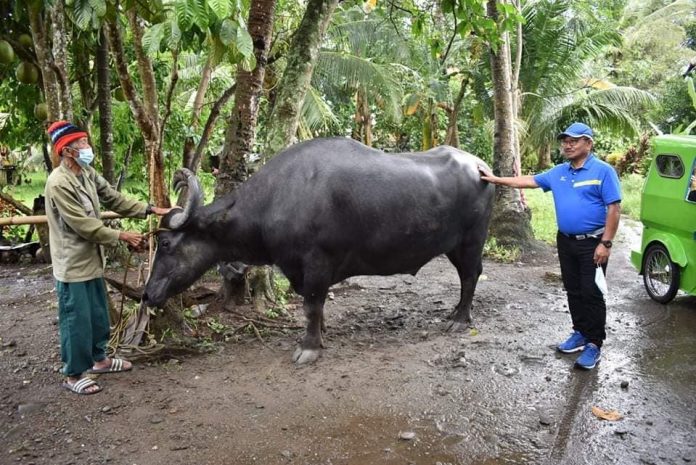The province of Sarangani is home to probably the biggest carabao in Mindanao.
An 18-year-old carabao owned by a farmer in Barangay Pangi, Maitum town has won an online fun search for the biggest traditional farm animal initiated by Mindanao Development Authority chairperson, Secretary Emmanuel Piñol.
It measures 141 inches long from nose to tail and 61 inches tall, much larger than the 50 inches to 54 inches average for a male Philippine carabao or domestic swamp-type water buffalo (Bubalus bubalis).
“This is the biggest that I’ve seen in my entire life,” Piñol said in a video posted on YouTube on Friday.
He visited Barangay Pangi on July 13 to see the huge carabao and its owner, 88-year-old farmer Flaviano Tamba.
The former agriculture chief launched a “fun game” through his Facebook page in May to search for the biggest carabao/bull in Mindanao in line with the celebration of Farmer’s Month.
A report from the Sarangani Information Office said Tamba’s son Lorenzo sent photos of his father’s massive carabao with some grandchildren on top and “it won the contest hands down.”
Tamba said he bought the young bull for PHP30,000 in 2005 when it was only three-and-a-half years old from a farmer in Barangay Lebe, Kiamba town.
He took care of the carabao well and it eventually became sturdy, making other farmers want to buy it at a higher price but were all thumbed down.
Tamba, who originally hails from Culasi, Antique and settled in Maitum in 1958, said the enormous bull has been helping them with various work at their seven-hectare farm, which is planted with coconut trees, bananas, and palay (unhusked rice).
Piñol had promised to give the winner of the fun contest some 60 heads of “Manok Pinoy” as prize and came to Maitum to deliver them.
He turned over to the Tamba family 50 female and 10 male free-range chickens, all two-and-a-half months old, which were bred at his farm in Kidapawan City, North Cotabato.
“This will help them start their own backyard chicken-raising program,” he said in the video.
Piñol, who popularized the “Manok Pinoy”, said the chicken is a crossbreed of a female from America and a locally bred male.
He advised the family to allow the chickens to acclimatize with the area before releasing them to their surroundings.
They can place them in a space covered by nets, with ample feed and water, he said.
“This is my personal prize for him (Tamba). I’m also here to show that we in the government keep our promise,” Piñol said. (PNA)







